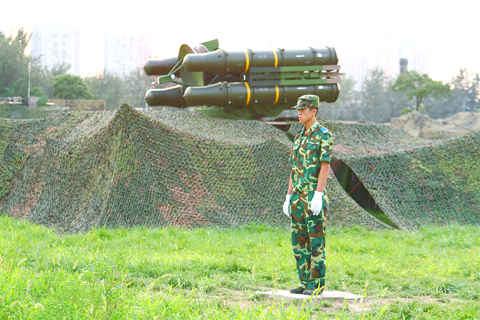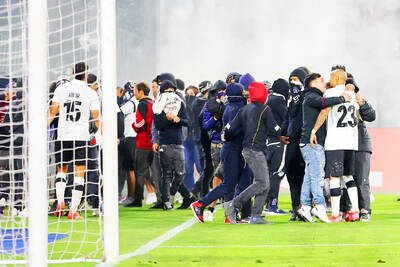A short walk from the National Stadium, near a busy coach station, there is a wire fence around a plot of land and a plain white sign with words in Mandarin and English that read: “Military Administrative District, No Admittance.”
It has become a tourist attraction of sorts, where both locals and foreigners gather to take shots of the guards standing to attention in front of a battery of missiles.
On a recent visit, it appeared the soldiers clad in military fatigues were controlling drones. They were fiddling with portable devices and looking heavenward, where a number of kites were also flying.

PHOTO: JOHN HANCOCK
While the idea of rocket launchers in such a built-up area is unsettling, it would be inconceivable for an Olympics to take place without a military presence of some sort.
This is especially true after Sept. 11, 2001, when terrorism redefined what was possible in terms of creating destruction. Greek Secretary General of Information Panos Livadas underlined this point on a visit to Beijing last week.
He said the Athens Games were the first after Sept. 11 and security costs were six times greater than had been anticipated because of it. It has set a precedent for all other Olympics, he added.
“Ours was the first Olympics to deal with this problem and that was one reason why there were delays [with our preparations]. Thank God there wasn’t an attack, but you have to be ready,” he said.
The authorities in Beijing keep reminding us of this. Earlier this week the director of security for the Games, Ma Zhenchuan (馬振川), said the East Turkistan Islamic Movement (ETIM) was targeting Olympic venues.
“It’s not imaginary. We have been focusing on the ETIM and it has been labeled a terrorist group not only by our country, but also the international community,” Ma told China Central Television.
At the beginning of the month security forces uprooted five “terrorist groups” that were preparing to launch attacks, and said that 82 people had been detained.
Additionally, state media claimed, more than 40 Islamist training bases were smashed.
The security clampdown is becoming increasingly evident as we count down to the big day. There are three security rings around Beijing and police cars patrol the intersections of major roads.
There are 40 anti-terrorism units in the capital and 110,000 security guards have been mobilized to keep the streets safe. About 300,000 surveillance cameras have also been deployed to keep track of suspicious behavior, while neighborhood watch teams are on guard.
During the subway rush hour bags are X-rayed and examined for suspect items, despite the inevitable delays. At bus terminals in far-flung provinces packages are examined if they are headed for the capital. Packs of dogs sniff around for trouble at Beijing Airport’s brand new Terminal 3.
“Safety first” seems to be the approach, and though some critics are saying this is a cover to crack down on dissent and is taking the fun out of the Games, Beijing has international support.
Interpol and more than 80 countries are involved in anti-terrorism measures for the Games, in conjunction with the International Olympic Committee, said Liu Shaowu (劉紹武), director of security for the Beijing Organizing Committee, on Wednesday.
“The common enemy of [the] international community is terrorists … so we have to upgrade the security level,” Liu said at the press conference. “We want to have both safety and festivity.”
If there is an incident the organizers will be blamed for not doing enough, so precautions are necessary.
Athens faced the same criticism four years ago and anti-terrorism measures in London 2012 will likely be even tighter. The price of security is inconvenience and missiles based downtown.
But there is little to suggest so far that this will be the “killjoy” Games that some news organizations are trying to depict.
On the contrary, as the crowd of tourists gawking at and photographing the missile installation suggests, “measured approach” seems a more accurate description.
“John Hancock” is the Taipei Times correspondent for the Beijing Olympics.
Also See: BEIJING OLYMPICS: China’s shuttlers won’t have it all their own way

Two people died on Thursday after fans and police clashed outside the Estadio Monumental in Santiago ahead of a game in South America’s Copa Libertadores, Chilean authorities said. The fatalities happened shortly before the match between Chile’s Colo-Colo and Brazilian club Fortaleza, when police blocked about 100 fans when they attempted to enter the stadium. There were conflicting accounts of how the fatalities occurred, with local media reporting that one of the dead was a 13-year-old boy. The other victim was an 18-year-old woman, according to a relative at the hospital where she was treated. The fans died after being caught underneath a

A potential European league could be a gold mine for the NBA as the top-flight North American league looks to muscle its way into a deep pool of talent across the Atlantic Ocean. The NBA is exploring the launch of a European league with world basketball governing body FIBA as a partner, NBA commissioner Adam Silver said last week, with an eye toward a 16-team format made up of 12 permanent clubs and four qualifiers. The continent’s longstanding Euroleague quickly signaled its readiness to enter into talks with the NBA, even as it has balked at the idea of another league in

College basketballer Kaitlyn Chen has become the first female player of Taiwanese descent to be drafted by a WNBA team, after the Golden State Valkyries selected her in the third and final round of the league’s draft on Monday. Chen, a point guard who played her first three seasons in college for Princeton University, transferred to the University of Connecticut (UConn) for her final season, which culminated in a national championship earlier this month. While at Princeton, Chen was named the Ivy League tournament’s most outstanding player three times from 2022 to last year. Prior to the draft, ESPN described Chen as

College basketballer Kaitlyn Chen (陳凱玲) has become the first player of Taiwanese descent to be drafted by a WNBA team, after being selected by the Golden State Valkyries in the third and final round of the league's draft yesterday. Chen, a point guard who played her first three seasons in college for Princeton University, transferred to the University of Connecticut (UConn) for her final season, which culminated in a national championship on April 6. While at Princeton, Chen was named the Ivy League tournament's most outstanding player three times from 2022 to last year. Prior to the draft, ESPN described Chen as a